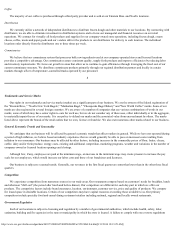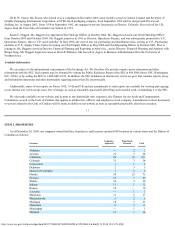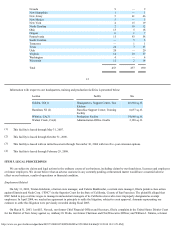Einstein Bros 2004 Annual Report Download - page 17
Download and view the complete annual report
Please find page 17 of the 2004 Einstein Bros annual report below. You can navigate through the pages in the report by either clicking on the pages listed below, or by using the keyword search tool below to find specific information within the annual report.
http://www.sec.gov/Archives/edgar/data/949373/000104746905006202/a2153240z10-k.htm[9/11/2014 10:13:29 AM]
Our expense trends for fiscal 2004 were broadly affected by five major categories:
•Increased prices for agricultural commodities;
•Rising energy costs and increasing costs of other natural resources;
•Adverse weather;
•Increased labor costs; and
•Increased taxes and costs of compliance with regulatory requirements.
In fiscal 2004, prices for agricultural commodities such as dairy, cheese and butter increased substantially. In fiscal 2004, our cost of goods
sold increased approximately $2.4 million as compared with fiscal 2003 as a result of increases in commodity costs. We believe that dairy prices
will decrease slightly in fiscal 2005, but that decrease may be offset by increased commodity costs for coffee, flour and packaging. Furthermore,
the hurricanes in the Southeastern United States in September and October 2004 created a shortage of certain produce items such as tomatoes. As a
result, the produce
19
that was available during the latter part of 2004 was both more expensive and of a lower quality than prior to these hurricanes.
Rising energy costs and the increasing costs of other natural resources affected not only the cost of distribution to our restaurants, but also
utility bills and the cost of packaging that is derived from petroleum products. Our distribution partners and common freight carriers passed on fuel
surcharges to us during fiscal 2004. We believe energy costs will continue to rise during fiscal 2005. Additionally because the cost of packaging
materials is generally established on an annual basis, we believe these costs will be greater during 2005 than the costs in 2004.
In addition to increased prices for produce, the adverse weather experienced in the Southeastern United States also resulted in increased costs
due to restaurant closures, spoilage of food products, and damage at our restaurants due to winds and flooding. During fiscal 2004, we estimate a
loss of approximately $0.5 million in revenue due to temporary store closures. The loss of revenue resulted in a negative impact to our margins of
approximately $0.3 million.
Due to competition for personnel and limited availability in the labor pool, we experienced an increase in labor costs during 2004. We
anticipate that we will continue to experience increased competition for personnel and declining availability in the labor pool during 2005. As a
result of these issues, we also anticipate that we will experience an increase in hourly and salaried wages, as well as an increase in benefits expense
as a result of rising costs of insurance. Additionally, federal overtime regulations of the Fair Labor Standards Act which went into effect on
August 23, 2004 may impact the classification of several of our positions. Changes in the reclassification of employees from management to hourly
employees could also affect our labor costs.
Certain states and local governments have increased both the rate and nature of taxes on businesses in their regions in an effort to offset
budget shortfalls. These increased taxes include real estate and property taxes, state and local income taxes, and various employment taxes.
We rely on our network of independent distributors to distribute frozen dough and other materials to our restaurants. We are continually
evaluating our distribution network to ensure it meets our internal criteria with respect to quality and service. In the event that certain distributors
fail to meet our internal criteria or our internal criterion is improved upon, we could incur an increase in distribution costs.
Impact of Inflation
We have not experienced a significant overall impact from inflation. As operating expenses increase, we recover increased costs through
pricing increases, to the extent permitted by competition. We also review and implement alternative products or processes.
20
Results of Operations for Fiscal Years 2004, 2003 and 2002
























